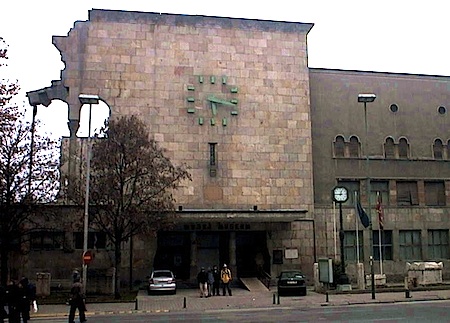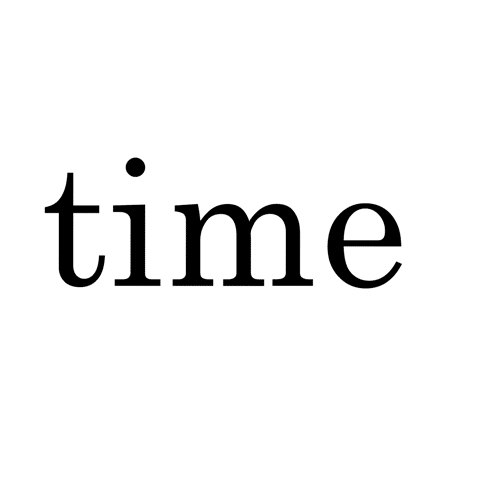Evolving, pseudo-random/contingent list and inventory of quotes thoughts, links and notes to (pre- and post-) accompany Le Temps Musical, two days that were dedicated to the concept of time in and of music, on Februay 6th and 7th, 2014, at Le Cube, Issy-les-Moulineaux.
Le temps, le temps musical
1-2-2014, and then after
"Rest, rest, perturbèd spirit! [...]
[...] The time is out of joint."
(Hamlet)
Centuries of centuries and only in the present do things happen
Jorge Luis Borges
« niet de tijd gaat voorbij, maar wij »
+/- Rutger Kopland
Nooit nu
Notre présent n'est jamais, n'a jamais le temps d'être [...] ( @@ )
Quod evum et tempus nichil sunt in re, sed solum in apprehensione ( @ )
"We are taught to see time as a stream, as a chain to which every next moment is added as a new bead. But is that flow not mere illusion? Should not, as a sign of the extent to which things differ, time itself eventually disappear? Is not the chain of now’s that we seem to live through but an image of our memory of change measured in terms of repetition?
Nothing ever repeats when there's no memory.
Without memory there’s no time.
That's why time 'r' us.
And sounds 'r' time: we can only ever listen now."
[ "Tijd is de maat waaraan wij de wereld meten, dat, waarin hij is geweest en waarin hij zal zijn, in een aanhoudend nu, welk, dat wat was, bevat, en waarin het komende gevat is. 'Nu is een zijn dat zijnde al is geweest,' schreef Hegel. We zijn gewoon te denken aan tijd als aan een stroom, een ketting waar onaflatend ieder volgend moment als weer een nieuw kraaltje wordt aangeregen. Dat is het menselijke, en daarom naïeve, beeld, opgeroepen door de wereld, niet zoals die is, maar zoals hij zich aan ons voordoet. Die stroom van opeenvolgende momenten is ongetwijfeld illusie, en verdwijnt de tijd, als enkel deel van de mate waarin dingen verschillen. De ketting van nu’s, die wij gewoon zijn te denken, is het beeld van onze herinnering aan de verandering zoals wij die ervaren en gewoon zijn te meten met herhaling. Zonder geheugen kan niets zich herhalen (gelijk blijven, maar toch veranderen): zonder geheugen – er zijn daar veel vormen van – is er geen tijd. De tijd, kortom, dat zijn we zelf. En geluid is als tijd. Want ernaar luisteren kan alleen in een nu, waarin wat er vooraf ging en dat wat er volgt al besloten liggen."
Uit: Alle Geluid van de Wereld (2010) (March 2nd 2020) ]
dub time
"Time in the Crypt isn't linear. It's dub time
... those mountain peaks in the distance are wavebands of time."
in: Fire Rush - Jacqueline Crooks (2023)
zen time (i)
"[...] Do not think that time merely flies away. Do not see flying away as the only function of time [...] The reason you do not clearly understand the time-being is that you
think of time only as passing. Time is not separate from you, and as you are present, time does not go away[:] you are the time-being right now"
(Time-Being - Eihei Dogen)
Time's tactic
"Het is bijna tijd"
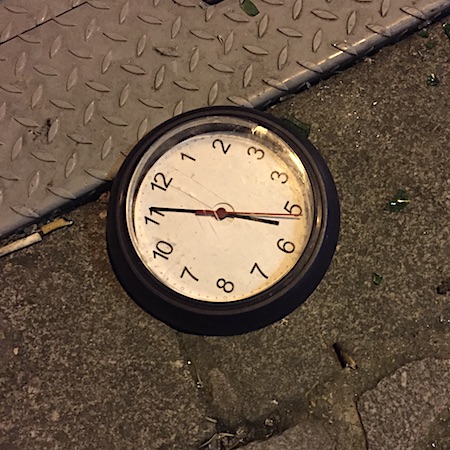
Day
The day is the fundamental unit of our solar time, of which there are two kinds: the apparent and the mean one. The discrepancy between them is described by what is called the 'equation of time'.
How to play the sound of time
[...]
My grandfather heard the cries of his dead brothers. That was the sound of his time.
Jonathan Foer. Here I Am (2016)
Genesis
[SB #341] "Visual perspective induced our notion of space, in which things can appear
in a many different places, but still be perceived as 'the same'. Auditory perspective induced our notion of time,
in which things can occur at a many different instances, but still be perceived as 'the same'.
Thus,
in days long gone, music gradually woke us from being trapped in an eternal. Now.
Now. You try to imagine what a such coming into being will have felt like...
Music sticks around to remind us."
Zeit ist eine Art Musik (Peter Handke)
...
Music probably is the closest imaginable physical equivalent of what we, naively, think of and experience as the passing of time - this so volatile measure of worldly changes.
Music epitomizes time, ...
..., time that spills from grids of tiny ticks. ( ° )
"Die Zeit des Tons tritt in Erscheinung nicht in der Zeit (als gäbe es Zeit schon vor und unabhängig von ihm), sondern als Zeit (indem der Ton selber sie setzt)." ( * )
(0) Opposing (i.e. 'relativizing') Isaac Newton's notion of absolute (invisible, unbounded and uniformly floating) time and of absolute (invisible, unbounded and unchanging) space, Gottfried Wilhelm Leibniz wrote in his Initia rerum mathematicarum metaphysica (1680-1682): Tempus est ordo existendi eorum quae non sunt simul, i.e. "time is the order of non-coexisting things" (it is the succession of coexistences); followed by Spatium est ordo coexistendi seu ordo existendi inter eas quae sunt simul, i.e. "space is the order of coexisting things".
There is no timeless music.
[ "And there have been times that I thought, at the most fundamental level, when people come and say: 'That's not music!' or 'That is music!', that the single most critical element is the structuring of time." ]
This is due to the fact that, physically, when being in a conscious state of mind, we are not (cap)able to not hear changes; however immutable or - indeed - absent sound(s) may seem, we will always be aware of change; because what we hear (sound) is the continuous, very local and very physical (material), variation in the pressure of air in and around our ears and the rest of our body.
Like time, music (sound) never really is. Present time, like music, is a something that is always becoming.
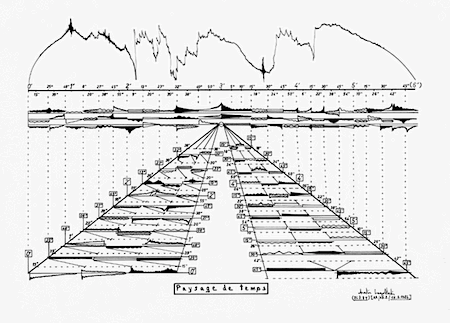
Rhythm and meter are the musical equivalents of clocks: "The human experience of musical time is linked to the ticking clock." ( ** )
In the Elementa Rhythmica, part of the surviving fragments of his treatise on music, the Greek peripatetic philosopher Aristoxenus of Tarentum (4th century BC; Aristoxenus was a pupil of Aristotle), aimed for a systematic theory of rhythm, which included the concepts of 'irrarional' duration (alogos) and that of a shortest, indivisible duration, a primary time-unit: the protos chronos. Though it is generally assumed, at least in our culture, so firmly rooted in that of the ancient Greeks, that the 'mode of expression' which evolved into our music, formerly was intimately linked to language and poetry, the protos chronos 'was not to be equated with the short syllable'. ( *** )
"What we now understand as 'time' in music," says Paul McNees, "used to only exist insofar as a note was held for as long as the syllable took to pronounce." In early examples of written scores of Gregorian chant, "notes have no inherent 'time' value, but are connected to breath, syllable and flourish". ( **** )
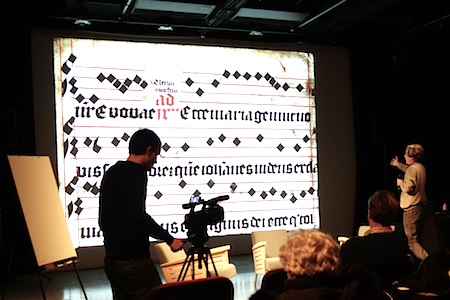
The protos chronos, an atomic, indivisible musical (temporal) event does not seem to correspond to our experience of music (time). That experience is not one of a sequence of discreet events, but that of un uninterrupted, a continuous floating; of, indeed: a contin-u-n-ity in/of time; of a - one - homogeneous time.
 (1) Jam karet is Indonesian ... 'Jam' means time, and 'karet' means rubber ...
rubber time ... It's a concept reflecting a very un-western attitude towards 'time' and its
'gestion'. The idea that 'time is elastic' ... things happen when they happen, it all just takes the time
it takes. [ cf. hors temps ]
(1) Jam karet is Indonesian ... 'Jam' means time, and 'karet' means rubber ...
rubber time ... It's a concept reflecting a very un-western attitude towards 'time' and its
'gestion'. The idea that 'time is elastic' ... things happen when they happen, it all just takes the time
it takes. [ cf. hors temps ]
(2) „χρόνος ἀριθμός ἐστίν“ ... Time is a kind of number (Aristotle, Physics Book IV, 11).
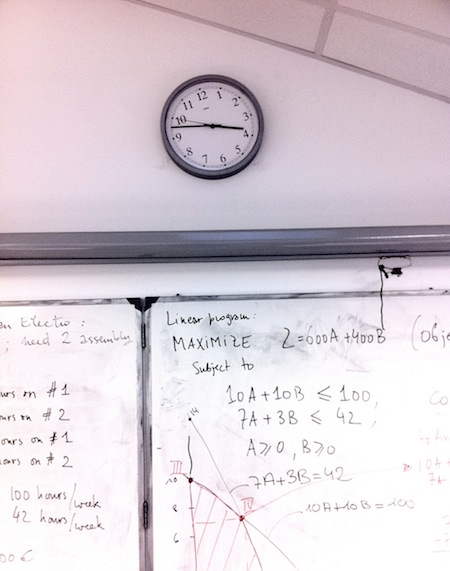
(2.1) Listen to Karlheinz Stockhausen talking (in 1982) about time, colors, music, art, the world, the universe, etc... In general, but also very specifically about the manipulation of musical time in his Klavierstück XIII (Luzifer's Traum) ... [ cf. Karlheinz's Song of Praise ]
(2.2) In Stockhausen's early, very stockhausian, paper '... wie die Zeit vergeht ...' (first published in 1957, in volume 3 of Die Reihe), time is identified as the determining variable of all aspects of sound and music. A composition's overall structure as much as each individual sound's color (the timbre) and each note's pitch ... all at their proper scale and dimension, Karlheinz says, are built from sequences of pulses in time. A time-continuum relates our notions of rhythm and pitch: what we call 'rhythm' are the infrasonic frequencies of impulses; what we call 'pitch' are the audible frequencies of impulses. Similar ideas about the relationship between musical time scales formed the core of Henry Cowell's New Musical Resources (published in 1930). And before him, Johannes Brahms already commented on the unity that exists between metrical structures and those which underlie harmony and tonality. The phenomenon each was discussing in his own way is generally known as the pitch-rhythm continuum (cf. Pythagoras and the Music of the Future Part III – Musical Time, by Robert Lennon).
(3) Leif Inge's Nine Beet Stretch is a recording of Beethoven's Ninth Symphony, digitally time-stretched to last for precisely 24 hours.
(4) A performance of the organ version of John Cage's piece As Slow As Possible in the St. Burchardi church in Halberstadt, Germany, started on September 5th, 2001, with a rest that lasted 17 months. The piece is currently still playing. In fact, it still is merely beginning, as the performance is scheduled to end in 2641, thus completing a musical time bow of 639 years.
(5) „...wie die Zeit vergeht...“ - Zu Husserls Phänomenologie des inneren Zeitbewußtseins aus musikphilosophischer Perspektive (pdf), a paper by German composer Tom Rojo Poller.
(6) A Concept of Time in a Music of Southeast Asia (pdf), by José Maceda. Edited by Chris Brown.
...
...
zen time (ii)
[...] "Doubt itself is nothing but time[,] the self is time[,] each moment is all being, is the entire world [...] being splattered with mud and getting wet with water is also time [...] the rat is time, the tiger is time, [...] nothing but being, [...]
nothing but time..."
...
(Time-Being - Eihei Dogen)
...
"On the formal level, the discourse of each human group rigidifies itself against time - the medium of continuousness and indeterminacy." [******]
...
In the afternoon of Saturday February 8th, in the wake of Le Temps Musical, we gathered for a 5th unPublic, in my living room in Vincennes. With Jeff Kolar, who had come and stayed with us as part of his European tour, and also participated in the 'musical time round table' at Le Cube, Hanna B., Anton Mobin, Rébus and myself... There's more about this session in the following SB entry.
...
Time was fast forward.
[...]
Time was and time wasn't.
Time wasn't. That's what it was.
( ***** )
...
Time buckles and bends.
( ******* )
...
... now you understand about Time?
Time is junk. Time is radioactive.
( ******** )
...
Triomphe du Temps, Jacques Jordaens ~ 1649/1652

...
Expressing time
List of 'time expressions', built on Daniel Wolf's About Time. My additions are in italics & colored dodgerblue or hyper-linked.
-|| About time || The Times They Were a-Changin' / Opening time / Where does time come from? / The beginning of time / Where has the time gone? / A long time / A short time / Time freeze / No time / Timely / Absolute time / Zero time / Time and a half / Overtime / All-time / Downtime / Uptime / In the meantime / A sense of time / Telling time
/ The test of time / Timeshare / Time will tell / Set the time / Clocktime / At the tone, the time will be / Time zones / Time's arrow / High time / Time switch / Time-worn / A fine time / The use of time / Time and money / Timestamp / Time is money / Timeless / Being and time / Being on time / In time / Enough time / No [more] time / Time immemorial / Quality time / Decay time / Spending time / Playtime / Time based / Me time / Real time / We time / Out of time / Father Time / Taking time / Tea time / One time / Stolen time / Lost time / Rubber time / Wasted time / Lifetime / Timeline / Time warp / Find time / Time and again / Make up time / Keep time / Time is of the essence / Time was uncounted, time didn't count / All the time in the world / Trying times / The Texture of Time / A rough time / Time piece / The best of times, the worst of times / The test of time / The Tooth of time / Doing time / Time-saving / Serving time / A time for everything / Treading time / Frozen time / Nap time / Wrong time / Right time / Reading time / Playing time / Playing for time / Time and motion / Space and time / Ragtime / Time after time / Stoptime / Old time / Recent times / Half time / Time and Tide / The time went down the drain / Time for good behavior / Time served / Time lapse / Time travel / Time signal / Travel time / Time creeps along / Time flows / Time flies / The time ahead / The time until / Call time / Times passes / Time off / Time out / Time in / Sick times / Swell time / Time running out / Time on our hands / Extra time / Time to run / Filling time / Treading time / Good timing / Bad timing / Good times / Bad times / Timing is everything / Time on our side / Closing time / Spare time / Leisure time / Endtime || The End of Time
||-
See also the seventh chapter of Andy Warhol's From A to B and Back Again, which is called: 'Time'.
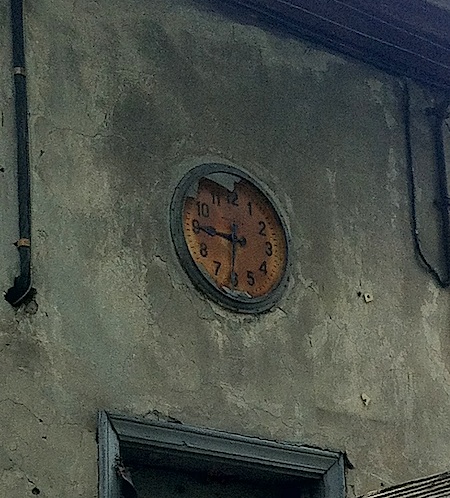
zen time (iii)
"[...]
Mind is a donkey, words are a horse.
Mountains are time. Oceans are time.
If they were not time, there would be no mountains or oceans."
(Time-Being - Eihei Dogen)
and meanwhile...
time drizzles on
notes __ ::
(@@) Jacques Roubaud, in Mathématique :, Éditions du Seuil, Paris 1997 [
^ ]
(@) In 1277 the then bishop of Paris Étienne Tempier, as part of a list of punishably bad beliefs, declared it heretical to think, teach or write that "age and time are not existing in reality, but only in the mind" [
^ ]
(°) after Momus, in his fiction Popppappp (2015) [
^ ]
(*) Hans Heinrich Eggebrecht Musik als Zeit
(Wilhelmshaven, 2001) [
^ ]
(**) Curtis Roads, in: Microsound, MIT Press 2001 [
^ ]
(***) Douglas Leedy Singing Ancient Greek. A Guide to Musical Reconstruction and Performance (2011) [
^ ]
(****) Paul McNees, The Irruption of Time in Music: From the Pre-rational to the Arational (2011 (?) _ pdf; retrieved February 2014) [
^ ]
(*****) From: "I'm right about time", by Laura Wetherington. (In: A Map Predetermined and Chance. Fence Books, 2011) [
^ ]
(******) Tim Hodgkinson, Music and the Myth of Wholeness. MIT Press, 2016 [
^ ]
(*******) William Burroughs. In The Revised Boy Scout Manual / (An)(The) Electronic Revolution, around 1970. [
^ ]
(********) William Burroughs and Brion Gysin. In The Third Mind, 1978. [
^ ]
tags: time, music, sound, zen
# .448.
comments for Le Temps Musical ::
|
Comments are disabled |

